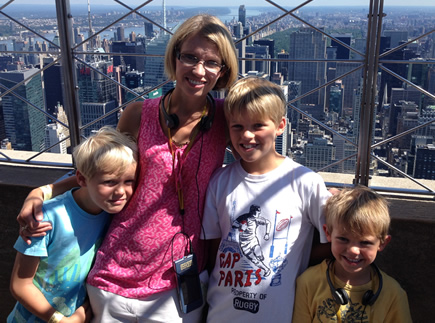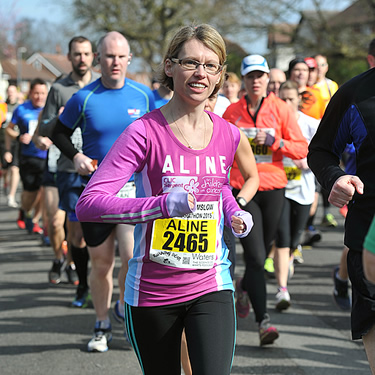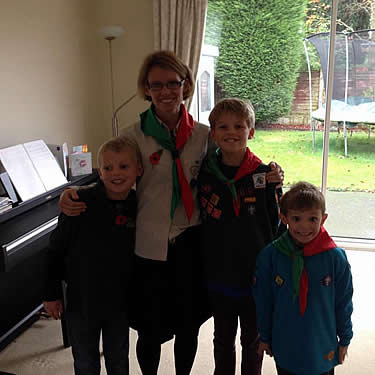#ChemEngCatchUp Episode 3 – Professor Aline Miller
Meet the Department 29 January 2016

Hello all! Thanks for coming back for the latest #ChemEngCatchUp. Can you believe we’re on Episode 3 already.
From the viewing figures it seems that Episode 1 James Winterburn and Episode 2 with Thomas Vetter went down very well, but I’d love to know your thoughts on them. Or on any part of the blog. Please fell free to use the comment section below!
Today we meet Aline Miller, a Professor in Biomolecular Engineering with the School. Unsure what Biomolecular Engineering is? I know I was. Not anymore, though, following this fascinating interview with Aline:
Hi Aline – thanks for chatting to us. Could you please describe your research for the layman in ten sentences or less?
[youtube https://www.youtube.com/watch?v=QCYhjLouEcY]So what we tend to do is we take inspiration from nature. Nature has had many millennia to produce highly organised, highly functional materials with 100% efficiency.
So we take our inspiration from natural materials, from shells, from how bananas organise when they grow, for example. And then we will actually design molecules, and look at how molecules interact with each other, and design them so that they pack and structure in a highly efficient and well organised way.
And then we can use those molecules to make materials on the micro, the miso, and the macroscopic length scale. Then we use those highly ordered, highly controlled materials for everyday applications. Examples include regenerative medicine – or in understanding how shampoos and conditioners are made so that we can make them more efficiently for the companies that we work with.
And how can your research benefit the public?
Our research is very much focused on translation. We have developed a spin out company which is looking at developing some of our materials for the regenerative medicine field. So, for example, we’re using some of our peptide hydrogel materials, which we can control the structure and mechanical properties of, for other research groups in other universities to embed cells in, in three dimensions, and then they can grow and proliferate into different types of tissue, from cartilage to bone.
Then we also work with several companies where we translate our structure/property correlations into processing knowledge to improve the processing of, for example, shampoos and conditioners for Unilever.
But we also look at pharmaceutical applications and drug delivery devices so we can actually take our material and then target the active therapeutic at a specific site. For example, oncology is one application area. So instead of flooding your body with cancer drugs that end up damaging the healthy and the cancerous tissues, we’re looking at developing our materials so they just deliver the cancer therapeutic to the cancer tissue and not affect the healthy tissue.
Can you tell us how you first got interested in your research area?

I think I first got interested in science because my parents bought me a chemistry set. I used to play around and create explosions and fires and things in the greenhouse when I was younger.
But I spent a year of my undergraduate degree over in the States and that’s when I started getting interested in research. Polymers was an area I was particularly interested in because it seemed at the time to be a thriving industrial community in the States and also the UK- one that had real applications.
So that’s where I started to get interested, and then I actually applied some of the physics that I learnt about polymers to chemical and biological problems. And then we’ve slowly, over the twelve years I’ve been in Manchester, actually taken that fundamental knowledge and turned it into actual products, improving everyday lives of people, really.
Going back a bit further, then, can you tell us who or what inspired your interests in science and engineering?
[youtube https://www.youtube.com/watch?v=A84V8YZJ7HQ]
I think I was always interested in maths; I was always interested in problem solving. In a very logical black and white way, if you like. And I worked with a few people in my undergraduate who really encouraged me to ask questions about unknown topics. That’s when I started to get interested in research. And in trying to understand and come to some conclusion and develop rules for how molecules self-assemble and affect material properties.
My post-doc supervisor is someone who inspired me to do research. She’s eminent in her field and a very good role model for someone who wants to combine a career and family life.
On that note, then – what do you get up to in your spare time?
Well I have a family; I have three young boys aged six, eight, and ten. So they take up most of my time! But I also run beaver scouts which my boys have gone through and my youngest is now in and it’s a lot of fun, something very different from work. But again, you have to just be organised and plan and coordinate activities for them.
I also do a lot of running. I like long distance running and it’s a good stress relief from the daily grind!
I’d definitely agree with that! One more question, then – can you tell us how being here in Manchester has helped your work and research?
[youtube https://www.youtube.com/watch?v=wjCXKVPQLBY]I think working in a chemical engineering department, as a chemist who has worked in chemistry and physics departments, has influenced my work because we’ve focused a lot of the end product and actually translating our fundamental science into engineered products.
But also Manchester, it’s a very big university, and that had got its benefits because we work with experts in chemistry, in pharmacy, and in the medicine faculty.
So we’re actually really taking our materials from the lab, and the creation of our materials that we do here, all the way through to clinical applications. And that’s a huge benefit that Manchester’s enabled us to realise.
Brilliant, thanks Aline. What an interesting interview. After only 3 episodes, I think we’re already seeing an amazing variation of research taking place in the School. It’s great to hear that the work our researchers are doing can help with things as varied as regenerative medicine and haircare! Who knew?
And just to continue the theme of variety, the series will be back in a month’s time when we talk to Soil Scientist Nima Shokri! See you then.


Leave a Reply